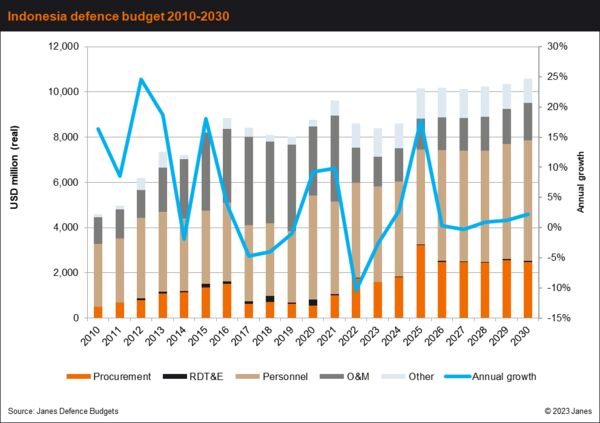
Indonesia's defence procurement expenditure is forecast by Janes to grow significantly in 2025. (Janes)
Indonesia has proposed a 2025 defence budget of IDR165.2 trillion (USD10.6 billion). Budgetary documents issued by the Ministry of Finance on 16 August show that the new budget would amount to a near 6% decline on the expected final defence expenditure in 2024 of IDR175.1 trillion. However, this final expenditure for 2024 marks a significant increase over the original allocation for that year.
The documents said the “strategic outputs” of the 2025 defence budget, which accounts for about 6% of total government expenditure for the year, include military procurement and sustainment, soldier welfare, and strengthening defence facilities particularly along maritime and land borders.
The defence budget for 2025 includes IDR80.4 trillion for ‘management support' including operations, IDR10 trillion for soldier welfare, IDR69 trillion for military procurement, and IDR1.6 trillion for defence research, development, and industry.
The documents said defence procurement will be framed by Indonesia's “fulfilment of the Minimum Essential Force (MEF) programme”. The MEF programme was initiated in 2010 and was originally scheduled to conclude in 2024.
Earlier phases of the programme were focused mainly on tackling the country's long-running local insurgency. The current phase, which started in 2020, is intended to shift emphasis towards a two-pronged defence posture: continuing to strengthen internal security and bolstering external territorial defence.
However, funding constraints have impacted previous phases of MEF likely reflecting the requirement outlined in the budget documents to continue the project.
Funding constraints have also impacted one of Indonesia's most high-profile programmes: its engagement with South Korea on developing the KF-21 fighter aircraft. On 16 August South Korea announced that Jakarta had reduced its funding commitment to the programme, from USD1.1 billion to USD450 million.
Looking to read the full article?
Gain unlimited access to Janes news and more...







